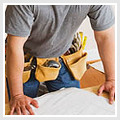
Owning a house or business premises can be an expensive journey when things stop working. To call out a tradesman can be quite costly, and indeed getting a decent tradesman in the first place is quite a challenge. So with this in mind, we are going to do a series of blogs on DIY around the home or office. To kick off we will look at plumbing and drainage.
Most homes or business premises will have a mains supply of water, supplied either from the local council or pumped in from a well. The normal set up is for the mains water to be connected to the main kitchen sink, where a tap (stopcock) will be added to control the water flow. The water supply is then usually directed to a large water tank, which is placed in the attic, plumbing to the rest of the house will usually be piped from this tank.
So with this in mind, if we experience a leak, the first thing to do is turn off the water by using the stopcock under the sink, to stop the main supply in, next turn off the stopcock from the attic tank. This can be found either just below the tank in the attic, or in the hot press where the immersion heater may be housed. Once the water flow has been shut off, see if you can find exactly where the leak is coming from. Check all rooms, particularly toilets, shower rooms, bathrooms etc. Once you identify where the leak is coming from either call a plumber or repair the problem yourself. If there is a major bust pipe or something more serious, a plumber is the best course of action. Some smaller leaks can be repaired by a handyman and there are quite a few videos on YouTube showing step by step instruction on how to fix leaks, change tap washers, bleed radiators, and numerous other plumbing DIY jobs around the house. If you can afford the luxury, spend a bit of time to ensure you know exactly what tools and methodology may be required to sort your problem.
Waste water is usually discharged from the sanitary appliances through narrow plastic pipes. These are then connected to a large vertical pipe, which is then sent into the main underground drainage system.
Toilets getting blocked, showers and sink units not draining out, gulley traps and manholes overflowing can be a major annoyance. Routine maintenance can solve a huge amount of these problems. I recommend a six monthly check to ensure free flowing drains around the home.
Check each sink unit for a build-up. Remove the sink plug and physically check if there is any build-up of waste on the underneath section, at the top of the outlet, a sure sign of a blockage is if the sink or shower is slow to drain out. If you discover a blockage, clean out any access remains and thoroughly flush out with a running water. For stubborn blockages try a plunger and then use of a liquid drain un-blocker. Drain Unblocker available online or in most good hardware stores, is highly recommended, or alternatively use the Supatool flexible drain cleaner spring wire. Pay particular attention to the bathroom where the residue from shaving, hair, and skin can build up quite quickly causing the outlets to slow down. As with all cleaning solutions, make sure to read the instruction first. Ideally flush out your drains at least every six months.
Now let’s move outside…The drain itself might run to the main sewer or, in rural areas, to a cess pit or septic tank buried in the garden. It does no harm to make sure you identify the location of your gullies and outside drain holes. Lift up the gully and manhole covers periodically (at least once a year) and check if there is any build-up of waste here. If there is a serious blockage then sewer rods may be needed to clean this out. These are quite easy to use but ensure you turn them only in a clockwise direction, in the drains or they may come loose and add to your problems.
Gutters and down-pipes, around your home also need routine maintenance. Check for signs of overfill by moss and other matter, and clean out as required. If you have weeds growing in the gutters this needs sorting quickly. If you are unable, (or afraid) to climb a ladder, ask the window cleaner to this job for you.
Basic routine maintenance and checking can eliminate build up and avoid expensive call out charges, so get checking yours now.
Remember you can order all your household requirements online at www.hardwareireland.ie. For more information on our products or services, please email info@hardwareireland.ie or call 00353 (0)1 456 0215.









